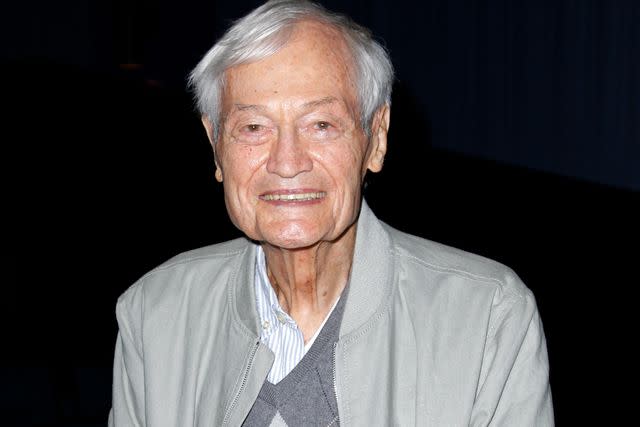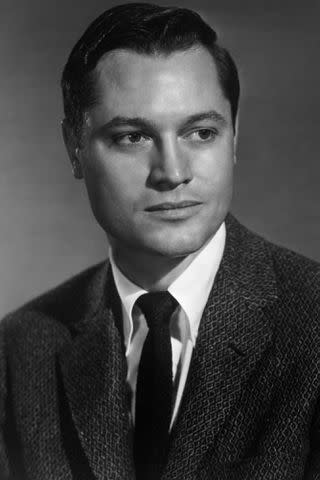Roger Corman, independent film pioneer and 'King of the Bs,' dies at 98
He was the influential director, producer, and distributor behind numerous low-budget horror, science fiction, and crime movies.
Roger Corman, the director, producer, and distributor of numerous low-budget horror, science fiction, and crime movies, whose career in Hollywood spanned eight decades, has died at the age of 98.
Nicknamed “King of the Bs” and “The Pope of Pop Culture,” Corman was the visionary behind B movies and cult classics like 1964's The Masque of the Red Death and the original The Little Shop of Horrors, from 1960.
Corman’s wife and daughters released a statement on his official Instagram account late Saturday evening confirming his death.
“It is with profound sadness and boundless gratitude for his extraordinary life that we remember our beloved husband and father, Roger Corman,” read the statement. “He passed away on May 9, at home in Santa Monica, California, surrounded by his family. He is survived by his wife Julie and his daughters Catherine and Mary.”
They continued, “He was generous, open-hearted, and kind to all those who knew him. A devoted and selfless father, he was deeply loved by his daughters. His films were revolutionary and iconoclastic, and captured the spirit of an age. When asked how he would like to be remembered, he said, ‘I was a filmmaker, just that.’”
They did not provide a cause of death. Representatives for Corman did not immediately respond to EW's request for comment.

Tibrina Hobson/Getty
Roger CormanFellow venerated director John Carpenter paid tribute to Corman with a social media post on Saturday evening. “Roger Corman, one of the most influential movie directors in my life, has passed away,” he wrote on X. “It was my privilege to know him. He was a great friend. He shaped my childhood with science fiction movies and Edgar Allen Poe epics. I'll miss you, Roger.”
Ron Howard also expressed his gratitude to Corman, writing, "RIP Roger Corman. A great movie maker and mentor. When I was 23 he gave me my first shot at directing. He launched many careers and quietly lead our industry in important ways. He remained sharp, interested, and active even at 98. Grateful to have known him."
Director Robert Rodriguez called Corman "a huge inspiration as both a filmmaker and a businessman," adding, "Creating your own IP at your own studio while inspiring other filmmakers was a lesson so many of my generation learned from him."
.@RogerCorman was a huge inspiration as both a filmmaker and businessman. Creating your own IP at your own studio while inspiring other filmmakers was a lesson so many of my generation learned from him. In 2018, it was an honor to screen and discuss with Roger my favorite of his… pic.twitter.com/W6VvR6sONQ
— Robert Rodriguez (@Rodriguez) May 12, 2024
Born in 1926 in Detroit and raised in Los Angeles, Corman worked his way up in the film industry through sheer determination and tenacity. Like many of his generation, he served in the U.S. Navy, from 1944 to 1946; after finishing his tenure, Corman returned to Stanford University to earn his degree in electrical engineering. The life of an engineer was not for him, however, and by 1950 he had landed a job in the mail room at 20th Century Fox.
Throughout his career, Corman had a tentative relationship with the major studios, occasionally working with them while continually challenging them at the box office with his own independently produced projects.
Related: Roger Corman to receive Master of Horror award at Overlook Film Festival
In 1954, Corman made his first feature, Monster From the Ocean Floor, using some of the money from a script he sold to Allied Artists earlier that year. For the rest of the decade, Corman produced and directed B movies in a number of then-popular genres: Westerns, sci-fi creature features, and the rock & roll teen pictures Corman would later translate into ‘60s counterculture fare, like 1966's The Wild Angels and 1967's The Trip.
Corman’s 1960 flick The Little Shop of Horrors (shot in a record two and a half days) would later become an immortal movie musical in 1986. But his directing career arguably reached its commercial and artistic peak with his Poe Cycle, a series of horror films based on the work of Edgar Allen Poe, most of them starring Vincent Price.

Hulton Archive/Getty
Roger CormanAs a producer, Corman was an invaluable part of James H. Nicholson and Samuel Z. Arkoff’s venerable B-movie outfit American International Pictures. By the early ‘70s, however, Corman was growing restless, so he founded New World Pictures in 1970. New World became an incubator for new talent in Hollywood, thanks to Corman’s willingness to take a chance on young directors (who would also work for cheap). Jonathan Demme was once such an upstart, as were Joe Dante, Francis Ford Coppola, James Cameron, John Sayles, Peter Bogdanovich, Ron Howard, and Stephanie Rothman.
Related: Celebrity deaths 2024: Remembering the stars we've lost this year
At New World, Corman perfected a B-movie formula that would soon form the backbone of blockbusters like 1975's Jaws. A Corman-produced picture was expected to be written, shot, and edited quickly, on an extremely tight budget. Martin Scorsese, whose film Boxcar Bertha was a New World project, called his experience with Corman “a real film school … you learned as you worked.” In a 2014 interview, Demme described the “Corman formula” as “a good degree of sex, some violence, a bit of nudity, and perhaps a subtle social statement” — an approach that sometimes stirred up controversy.
Among New World’s greatest hits were Women in Cages (1971), Death Race 2000 (1975), Rock 'n' Roll High School (1979), Children of the Corn (1984), Piranha (1978), Galaxy of Terror (1981), and Corman’s own Battle Beyond the Stars (1980).
Although the films Corman produced and directed were mostly B movies and exploitation fare — he did direct one serious drama, his 1962 antiracist film, The Intruder, with William Shatner — his personal tastes skewed more towards European arthouse films. He reflected those tastes in New World’s distribution arm, through which Corman released Ingmar Bergman’s Cries and Whispers in the United States, as well as films by Federico Fellini, François Truffaut, and Akira Kurosawa.
In the VHS era, Corman sold New World and founded — and abandoned — multiple production companies, including Concorde Pictures, New Horizons, Millennium Pictures, and New Concorde. The last feature film he directed was Frankenstein Unbound in 1990.
Want more movie news? Sign up for Entertainment Weekly's free newsletter to get the latest trailers, celebrity interviews, film reviews, and more.
In 1990, Corman also released an autobiography, How I Made a Hundred Movies in Hollywood and Never Lost a Dime. In the ‘90s and 2000s, Corman settled into his role as an elder statesman, giving talks and appearing in documentaries, offering advice to would-be independent filmmakers trying to make it outside the system. In 2011, a documentary about his life, Corman's World: Exploits of a Hollywood Rebel, was released, featuring famous protégés like Scorsese, Robert De Niro, and Jack Nicholson celebrating Corman’s influence on their lives and careers.
At a 2016 event honoring his career, Corman said, “The main thing is, I love making pictures. I love the process of making motion pictures. I intend to continue as long as I live.” And he did: At the time of his death, Corman had a producer credit on an astonishing 495 films.
Corman married film producer Julie Halloran in 1970, and the two stayed together until his death. They have four children.
Read the original article on Entertainment Weekly.


